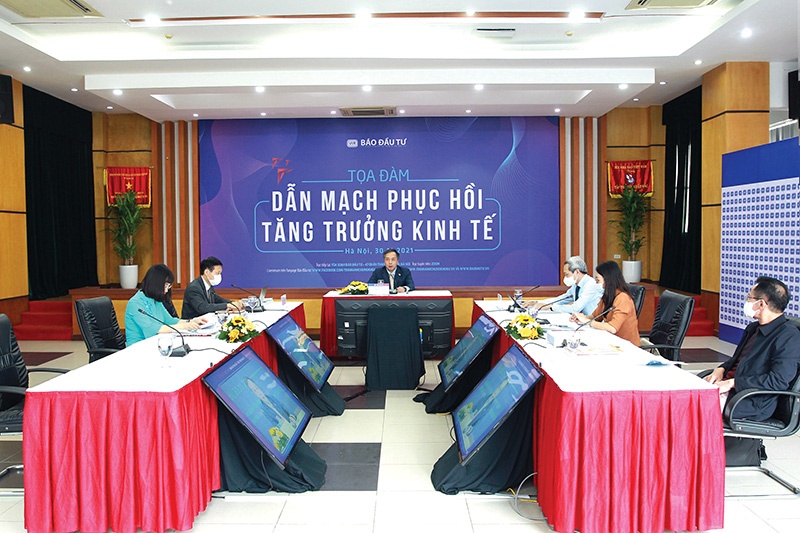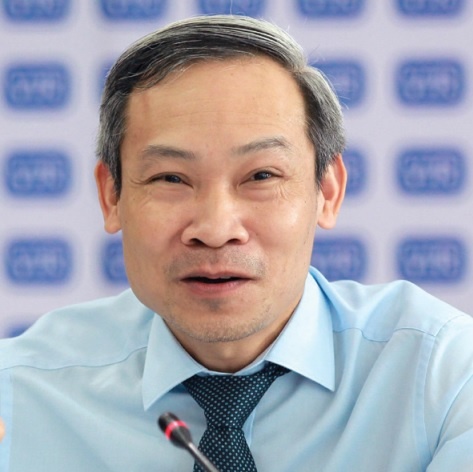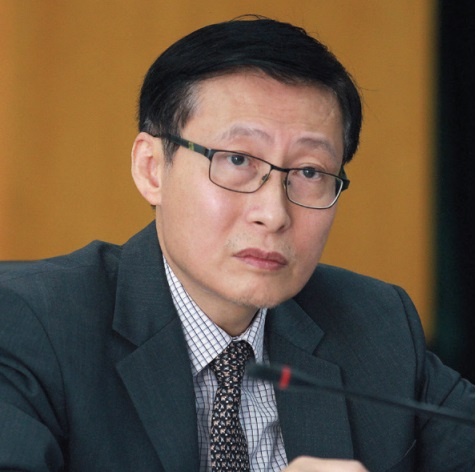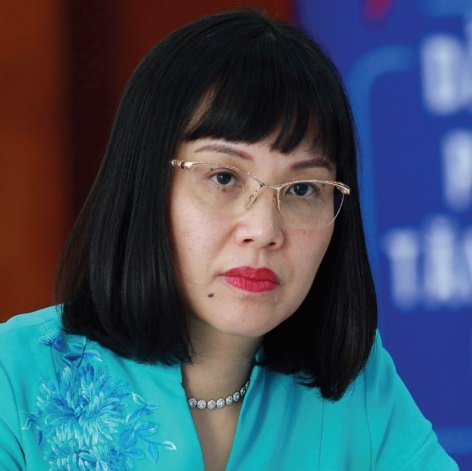Suitable economic recovery hinges on monetary policy
 |
| Last week’s seminar pored over the obstacles in the way for the economy to bounce back, photo Chi Cuong |
The International Monetary Fund and other global organisations have warned of inflation potentially reaching as high as 3.5-4 per cent, with inflation in industrialised countries already at an all-time high. Thus, many central banks are forecast to hike interest rates, including those in the US, Australia, and the UK, to curtail rising pricing pressures.
The resulting increase in global borrowing rates could be extremely undesirable for developing nations striving to return to pre-pandemic production levels, warned economist Le Xuan Nghia. He added that while other nations are nearing the end of their economic support packages, Vietnam is only halfway in its journey, presenting it with a variety of concerns.
“Soaring price pressures would be among the largest obstacles for Vietnamese businesses and authorities in the short run,” Nghia stated at last week’s seminar on the banking sector leading the way for the economic bounce-back, held by VIR in collaboration with the State Bank of Vietnam (SBV).
He added that Vietnam’s core inflation index is at a low level and the risk of cost-push inflation is short-lived - as instead Vietnam will face demand-pull inflation in the future. Furthermore, with many nations being on the verge of devaluing their currencies, Vietnam’s exchange rate policy is in a precarious situation.
Replacing monetary expansion
“It is estimated that Vietnam can utilise 5-7 per of GDP to support the economy through fiscal policies,” recommended Nguyen Minh Cuong, principal country economist at the Asian Development Bank in Vietnam. “We must act in a swift, urgent fashion to tackle the problems. Timing is an essential issue.”
Nghia also agreed on this. He suggested that in order to help the domestic economy, a big enough assistance package, equal to 5-7 per cent of GDP, be implemented in the short term, with an emphasis on labour market recovery and economic development.
In addition to the interest rate assistance package, direct budgetary resources are required to guarantee loans for small- and medium-sized businesses.
However, Phan Duc Hieu, permanent member of the National Assembly Economic Committee and vice director of the Central Institute for Economic Management, said it is difficult to determine the precise amount of the support package from the start.
“Ballpark figures of trillions of VND are not very convincing without clear terms on where the money would be spent,” he explained, adding that determining the main targets would be crucial.
Hieu also advised adopting market measures as much as possible and minimising administrative measures to avoid support package races like the ones in 2008-2009.
One of the major concerns while developing the assistance package was that the money would go to enterprises that are not sustainable, or “zombie businesses”. He said assistance must be selective, focusing on enterprises that can innovate and evolve to adapt to the new circumstances.
Little chance of interest rate cuts
After a continuous decline in 2020, headline inflation edged up in the first half of 2021 as consumer prices are rising in both developed and emerging economies.
“In response to the outbreak, many major central banks across the globe have slashed interest rates and begun quantitative easing in 2020 and maintained these policies in 2021. Now, however, some central banks are signalling intentions to raise interest rates to curb spending and keep inflation from soaring too much,” Cuong of the ADB told VIR.
At some central banks, there are more and more discussions being held about the timing of neutralising expansionary monetary policies. The US Federal Reserve decided to start tapering bond purchases in November.
“Central banks beginning to reverse expansionary monetary policies would be a positive signal that the world economy is gradually recovering, minimising the risk of a global economic crisis. The negative impact on Vietnam would also be faint as it would be an indirect effect,” a Vietcombank Securities statement shared.
Meanwhile, KB Securities believed that it is unlikely that interest rates would continue to be reduced in the context of existing inflationary pressures. The risk of increasing bad debts as loans mature in the coming quarters may also cause commercial banks to maintain high net interest margin and provisions, which makes further cuts to lending rates even more unlikely.
On the other hand, with an accelerated vaccination programme in major cities, the pandemic is gradually being brought under control, social distancing regulations are gradually being lifted and are less likely to be tightened again. Capital demand, accordingly, is predicted to recover soon, driven by the recovery in production and consumption.
According to SSI Securities Corporation, the SBV recently revealed that domestic banks had surprisingly logged 10.1 per cent year-to-date credit growth by November 25 (against 8.4 per cent in the first 11 months of 2020). That implies that about VND126.6 trillion ($5.5 billion) of new credit was provided to the economy in November – almost twice as much as in October. The uptick in credit growth is a good signal for recovery, reinforcing improving macro data in the same month.
Another reason for the rise in outstanding credit is the interest-subsidy package in Ho Chi Minh City, which has been ratcheted up from October to support recovery from the summer peak of the COVID-19 pandemic. Data from the SBV’s Ho Chi Minh City branch has confirmed that about VND447 trillion ($19.43 billion) of credit was issued to households and businesses to date, up 120 per cent compared to estimates from the beginning of the year, and up about VND200 trillion ($8.7 billion) since September.
“Overall, the worst appears to be over, with the easing of lockdown measures across the country and with credit back on track for the rebound. Therefore, we expect that 2021 credit growth will reach 13 per cent on-year, in line with the recent rise of credit growth caps for domestic banks,” SSI noted.
“To reach that figure, roughly VND250 trillion ($10.87 billion) of credit will have to be issued in December, which might be sufficient for credit growth to be in line with the pace of reopening.”
| Phan Duc Hieu-Permanent member National Assembly Economic Committee
Absorption capacity of the economic recovery programme is getting worse. We see that the better the programme’s performance is getting, the fewer risks they are facing. However, the economic recovery programme should point out various solutions for different objects and demands. According to international practices, we should not aid falling businesses that cannot resume activities even if with help. Besides this, we should pay more attention to institutional restructuring in all economic sectors. Building back better means resuming in a new way and finding new measures to do things based on breaking market barriers and improving competitiveness to outbalance poor-performance businesses. In the first 10 months of the year, there were 8,233 newly-established enterprises, while 7,346 ones withdrew or suspended operations. That means poor-performance enterprises are being replaced by new ones, which have better concepts and technologies. The bailout should be in line with market measures, and not conducted in an administrative way. So, assistance should be delivered to proper objects, instead of granted massively. Bui Thuy Hang-Deputy director general Monetary Policy Department (SBV)
The SBV will continue controlling monetary policy and banking activities to maintain liquidity and assist credit institutions in providing adequate capital for economic operation and recovery and manage interest rates to be consistent with the macro balances. In addition, we will encourage credit institutions to lower lending interest rates and strictly control credit in potentially risky sectors. We will also continue to promote cashless payments while ensuring cybersecurity. We will also restructure weak organisations to strengthen the banking system’s financial capability in terms of size and quality. Compared with other countries in the region, the SBV has had strong adjustments in interest rates. In 2021, it continued to decline to 0.7 per cent on-year. However, further reduction in deposit rates is not feasible as it may generate significant disruptions for credit institutions and affect liquidity of capital sources. We anticipate that inflation would be high in 2022, ranging between 3.5 and 4 per cent, owing to the economy’s vast openness and the possibility of imported inflation. Hence, it is necessary to tighten management of monetary policy. Nguyen Minh Cuong-Principal country economist Asian Development Bank in Vietnam
Compared with other nations, Vietnam has so far relied more on monetary than fiscal policy. According to the Asian Development Bank and others, Vietnam’s fiscal measures have so far represented around 2 per cent of GDP. Hence, the country should consider allowing an increase in public debt and overspending within a specified range, along with measures to establish fiscal discipline in the medium and long term. In the stimulus package to support the economy, it is necessary to clearly distinguish short-, medium-, and long-term measures. Short-term solutions to support workers and businesses also need to be more focused. One question is whether Vietnam has enough fiscal space to implement short-term measures, and three aspects must be considered for this: growing inflation, the resilience of firms and employees until short-term measures are implemented, and whether the country follows the pattern of rising interest rates and tightening the fiscal package or vice versa. In addition, the country needs more synchronous directives to facilitate businesses’ access to markets and funding. Nguyen Anh Van-Deputy general director LienVietPostBank
During the pandemic, commercial banks, including ours, have conducted many measures to strengthen credit growth and provide more services to clients, with some good results. We are always upgrading our technologies to maintain the connection to clients, as well as deploying various online services and products like e-invoices and telesales. To support customers, we have lowered loan interest rates and fees and applied credit packages to more people and businesses. We have checked the business situation of all clients and provided solutions to support them by restructuring their loans, delaying payment timelines, cutting fees, and adjusting disbursement plans following the cash flows of customers. The government should provide the economic recovery programme soon. We propose that the SBV removes obstacles for industries that are directly hit. We need a macroeconomic scenario to ensure the stability of the monetary market and make it easy for people and businesses to apply for affordable capital resources while offsetting interest rates of commercial banks and building special incentives for prioritised objects in agriculture, rural areas, and small- and medium-sized enterprises. |
What the stars mean:
★ Poor ★ ★ Promising ★★★ Good ★★★★ Very good ★★★★★ Exceptional
Related Contents
Latest News
More News
- Cashless payments hit 28 times GDP in 2025 (February 04, 2026 | 18:09)
- SSIAM and DBJ launch Japan Vietnam Capital Fund (February 04, 2026 | 15:57)
- Banks target stronger profits, credit growth in 2026 (February 04, 2026 | 15:43)
- Vietnam on path to investment-grade rating (February 03, 2026 | 13:07)
- Consumer finance sector posts sharp profit growth (February 03, 2026 | 13:05)
- Insurance market building the next chapter of protection (February 02, 2026 | 11:16)
- NAB Innovation Centre underscores Vietnam’s appeal for tech investment (January 30, 2026 | 11:16)
- Vietnam strengthens public debt management with World Bank and IMF (January 30, 2026 | 11:00)
- Corporate bond market poised for stronger growth cycle (January 28, 2026 | 17:13)
- Vietnam's IPO market on recovery trajectory (January 28, 2026 | 17:04)





 Tag:
Tag:




















 Mobile Version
Mobile Version